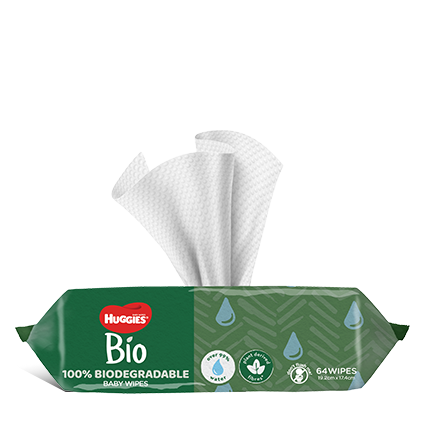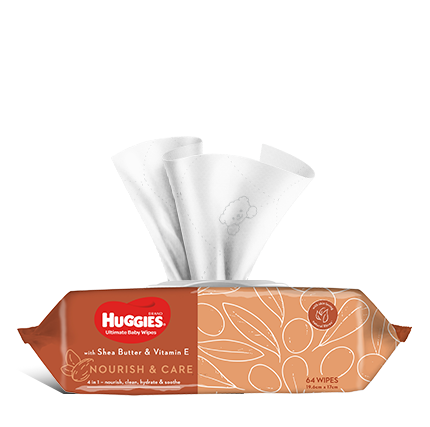This is a lovely, animated stage of life for your baby. They will be a constant source of entertainment and do their best to help you fall in love with them all over again, every day. You’ll have to compete with their hands though, because these will become your baby’s new best friends. They still won’t be able to control them but that will come with daily practice.
Watch as your baby develops increasing skills and progresses in their development. Though every baby is an individual and will follow their own pathways towards growth, all babies develop in a head to toe direction. That means your baby will learn to focus with their eyes first, then smile, learn how to control their head, their hands, learn to sit and so on. Eventually, your baby will be up and running, but only when each little developmental stage has been completed. You’ll be amazed at how much of this, and other milestones seem to be hard wired into your baby. Take delight in them and have some fun everyday. You are your baby’s best teacher and no one can do for them what you can.
Feeding
If you are breastfeeding and have been offering only one breast at feed times, you may find your baby wants to suck from both breasts now. You are likely to go through a period of adjustment until your breasts adapt but this generally only takes a couple of days.
All the nutrients your baby needs are in your breast milk, or contained in their formula. They do not need any additional food until 6 months of age. As well as being their primary source of nutrition, milk will supply them with all the kilojoules, nutrients and growth factors they need to thrive and develop.
Sleeping
Many babies are introduced to dummies in the newborn period. These can be very helpful with calming and soothing but often become a problem around this age. Many babies become “dummy dependent” and find it difficult to settle to sleep without sucking on one. This means parents need to frequently reinsert their baby’s dummy when it falls out of their baby’s mouth. If this is your experience, consider stopping its use. You are likely to have a couple of days of unsettledness with your baby until they learn how to settle without it.
Your baby is still in the age group where wrapping or swaddling is generally a useful way of settling. You will be finding that the wraps which seemed more than big enough just a couple of weeks ago, are getting just a little snug now. Wrap less of your baby if you need to or invest in some larger ones.
If it is summer time, make sure your baby is not becoming overheated under their wrap. A nappy with or without a singlet can be more than adequate in the hotter months.
Behaviour and development
Listen for the different coos and noises your baby makes this week. If you are lucky, they may even laugh out loud. You’ll soon learn when the best time of the day is to get responses from your baby. After their first feed in the morning, during bath time, when an older sibling pulls a funny face can all bring about a fresh bout of smiles and cooing.
Watch your baby hold up and support their head at around 90 degrees when they are lying on their tummy. Soon they will be able to use their arms to support their upper body weight, but don’t expect them to be able to hold steady for too long. They will sway to one side after a minute or two so make sure they are lying on a soft blanket which will protect their head from a hard bump.
Crying
If your baby is going through an unsettled period, fret not. This is a time where unsettledness and crying can peak, causing many parents to wonder just when and if, their baby will become calmer. Generally, 3 months or 12 weeks is seen as the golden time for babies to calm a little.
We don’t really know why crying makes such an unwanted presence at this age and although many theories have been put forward, no one is 100% sure of the reason. Overtired babies can become very loud, cranky and hard to please.
If you feel yourself becoming stressed or overwhelmed by your baby’s crying, stop what you are doing and place them carefully in their cot. Close the door if the noise of their crying is setting you on edge. Take a walk outside, have a drink, call a friend or have a shower. Sometimes just a 5-10 minute break from a crying baby is enough to defuse a parent’s stress and gain a fresh perspective on what other settling strategies could be tried.
Think about trying a sling if you haven’t already. Sometimes all babies want is to be held and to feel close to their parents. Slings can work very effectively in calming a cranky baby, even when other strategies aren’t working.
Routine
Still around 5-6 feeds/24 hours at 9 weeks of age. Expect a longer, uninterrupted sleep overnight though and take advantage of this yourself. Many parents aim to offer a last evening feed at around 10pm or just before they go to bed themselves. This is sometimes known as a dream feed, or roll over feed. It can be offered while the baby is still sleepy, but awake enough to suck effectively. Keep your stimulation low key and minimise your handling. Encouraging your baby to stay calm and sleepy can be very effective in persuading them to resettle easily after this late night feed.
Some babies will actually start sleeping for a 6-7 hour period overnight, causing their parents to wonder if this is too much. As long as your baby is having enough feeds to thrive and is having enough feeds over the rest of the day, don’t be concerned. Hunger will cause your baby to wake when they need to. Try to look at feeds as a total over a 24 hour period, rather than how frequently each of them are spaced apart at this age and stage.
What You Can Expect
Some women return to work when their baby is a couple of months old. This can mean another form of adjustment for the whole family with a transition to child-care and needing to be very organised. If you are still breastfeeding, be aware that there is legislation to support breastfeeding mothers and you may be entitled to lactation breaks in your workplace.
Many women successfully combine breast and bottle feeding. With planning and organisation they are able to continue breastfeeding their baby, or offering them expressed breastmilk for as long as they choose to.
Handling advice
Well meaning relatives and friends may offer you lots of advice on how to best manage your baby. Offering extra water, juice, keeping them awake through the day, using a dummy or not to, the list is endless. This can cause parents to become confused and worry if what they are doing is the right thing. Try to feel confident and secure in knowing what you are doing is right for you and your little one. Parenting is not a science, nor is it black and white. There is a whole range of different ways to achieve the same result and it is only by time, some trial and error and building confidence that you will work out what is right for you.
If your baby is healthy and growing, smiling and happy and importantly, you feel happy, these are the markers which should guide you.
For more information see Baby weeks or Baby Care.
Last Published* December, 2022
*Please note that the published date may not be the same as the date that the content was created and that information above may have changed since.
















